- Home
- Anne Rivers Siddons
Up Island Page 3
Up Island Read online
Page 3
“Why don’t you tell her to shut up?” I remember weeping once, when I had run to him yet again, this time over some obviously-to-me unflattering comparison to small Kevin. His natural grace and spilled-mercury vivacity, so like her own, were always being held up to me when I clumped or sulked.
“She doesn’t mean to hurt you,” my father said, holding me close enough to smell his familiar smell of Philip Morris cigarettes and sun-dried cotton undershirts. “She doesn’t even realize she does it. It wouldn’t be fair to her to yell at her.”
“What about to me? What’s fair to me? She’s always liked Kevin more than me. He’s her little boy.”
“Well, you’re my little girl, so we’re even,” he said.
And for the moment that would be enough.
It would invariably come up again, though, and I would rail at him once more: “Why won’t you make her stop? I can’t, but you could! You’re always saying people can change if they really want to; if you told her to, she’d change.”
“But I don’t want her to change,” he said. “If she changed, she wouldn’t be her, and that would break my heart. She’s the only magic I ever had in my life until you came along, Molly-o, and one day you’ll see that she’s the main magic in yours, too. You and I, we need magic. We’re earth critters. She’s our wings. Kevin has her wings, too. It balances out. All together, we make a family.”
And we were at the heart of it, though I did not know it then.
Neither of my parents ever really had a family, so when they married, they simply made some rules for what they had and called it, if only in their minds, The Family. They were not the first to make living, breathing individuals fit into the iron cage of an abstraction, not by any means. Ozzie and Harriet and Leave It to Beaver probably defined family for half the baby boomers born. But it is my own family—The Family—that is finally clearest to me, and I can trace easily the steps of its peculiar, tumorlike growth.
My mother, for instance, was abandoned by her feckless teenaged father when she was an infant and raised until age ten or so by her pretty, empty-headed, Irish mother in Savannah. When her mother, still only twenty-eight, took off with a hospital supply salesman to the Florida Panhandle, little Mary Belinda Fallon was taken in by her aunt Christy O’Neill in Atlanta, and raised with the O’Neills’ quarrelsome, cloddish brood of children in a clannish, dilapidated part of the city near the old Fulton Bag and Cotton Mill. Belle Fallon was all grace and moonshine and cloud shadow, profoundly unlike the O’Neills and unwanted by them, and when she graduated from Fulton High she left the mill village and crossed town, to the northside. She got a receptionist’s job at the Georgia Power Company during the day, and in the evenings, she took to the stage. There were few enough struggling local theatrical groups, and she was talented enough, and above all, attractive enough, so that she made her mark quickly. Belle Fallon at eighteen was the toast of Atlanta’s minuscule theater-going public.
By the time she was nineteen, she was singing and dancing and emoting in almost every production mounted within the city limits, and in some in outlying Macon, Birmingham, and Tallahassee. By twenty she had snagged her first featured part in a national touring company. At twenty-one she met and married my father, and by the time she was barely twenty-two, I was born and her career was dying, and The Family had begun to emerge as if from developing fluid. My father, himself an orphan raised in the Methodist Children’s Home in Forest Park, Georgia, had his own set of rules, his own blueprint for being a responsible adult, so he was content to let my mother draft the master plan for The Family. He knew no more of how to go about it than she did.
She began by assigning us all roles. Dad would be the provider, the supporter, the fixer, the protector. Beguiled by this creature of wood smoke and wild honey who had flown into his life and alit, he dutifully left his evening law studies at Oglethorpe University and went to work at the post office, where he stayed until his retirement forty years later. He made himself into a good household manager, a banker and accountant of some asperity, a fine handyman and fixer of things broken and faulty, and a steady and constant cheerer from the sidelines for the three lives he found himself in charge of. I think that my mother chose well: Dad seemed to me, all my life and his, to be content, indeed, happy, in his appointed role. In any event, he couldn’t have helped but cheer her on in whatever she chose to do; I never saw a man so quietly and totally in love with a woman.
I could hardly resent that. The love spilled over on me in full measure, and to a lesser but equally constant extent, on Kevin. But Kevin, for most of his life until he left home, wanted only Mother. If that disappointed Dad, I never saw evidence of it. It was part of the dynamics of The Family, and therefore meet and right.
Mother was the flame on our hearth, the giver of light and dazzle, the lightning rod, the visible totem of The Family. She was who we were, in our collective souls and to the world. Almost every family has one of these, but they tend to be men, or certain children of the tribe. The role of nurturing, minding, enabling does not allow for much dazzle. I think my hapless mother tried to be and do it all until I arrived, hefty and draftlike from birth, and she recognized with relief the designated giver. From the time I could toddle I was taught to accommodate, smooth over, prop up, set right. I don’t ever remember really minding. I did and do it well. My role gave me status and definition; there was never a time I did not know who I was to The Family. It was only when I aspired to anything outside the cage that I came to grief. Mother never unsheathed her arrows when I trod my road compliantly. That was when her whirling butterfly hugs and kisses were given; that was when her beautiful trained voice soothed and approved. As for those other times, I don’t know what or who I might be now if it had not been for my father. As I said, his half flourished.
Kevin was our future, who we would be, how we would be known.
“Listen to him; he’s already projecting,” my mother gurgled with delight when Kevin howled in his ruffled bassinet. He was born graceful and pretty; he looked like her from the outset. His silky black hair was somehow hers as mine had never been, though to my eyes they were identical. His blue eyes were Fallon and not Bell, as mine were said to be. He had her delicate, porcelain features, and not the strong, carved ones I shared with my father. When he began to toddle, it was with her flat-footed, straight-spined dancer’s gait. Even his tantrums were silvery and somehow theatrical. They made her laugh, as mine never did, and even my father smiled to see them. When Mother held him in her arms they seemed a Degas portrait: Mother and Child. Indeed, Dad once parted with a breathtaking amount of money to have a distinguished professor from the Atlanta School of Art paint them so, both of them bare-shouldered and bathed in dappled purple light from the blooming wisteria vine that sheltered our front porch. It is pure summer to look at; early summer, just before coarsening ripeness begins to swell. It hangs now in the living room of the condominium, as it did in the front room of the house on Peachtree Hills Avenue, where we sat when visitors came. Kevin and his wife wanted it when they first married, but Mother would not part with it. I knew of little else she had refused him.
So our paths were laid down from the beginning, and so we have continued since, in lockstep, four people destined and doomed to bear on our shoulders the living, holy ark of The Family. When I think of my mother’s voice, it is this that I hear her say: “Family comes first, always. Blood is everything.”
I told what I could of this to Livvy Bowen that morning.
“Your mother’s obviously read too much William Faulkner and Tennessee Williams,” Livvy said. “I can just see her in Williams. God. ‘Blood is everything’ my ass. Who does that make Tee and…what’s Kevin’s little wife’s name again? I can’t ever remember. Chopped liver? Official consorts? Does she include them in this family stuff? Do you?”
“Sally. Her name is Sally,” I said, obscurely annoyed. My attempt to explain The Family to Livvy had obviously fallen short. “Of course she includes them. Of cou
rse I do. Tee is family for me, just like Sally is for Kevin. Tee and Caroline and Teddy for me; Sally and Amanda for him. There was never any question in Mother and Daddy’s minds that we would marry and have children. That’s what makes family.”
But did it? Mother was drawn to Tee from the beginning, I knew that; she teased and flirted with him, charmed his conservative northside parents, shone as if klieg-lit when we invited her to the driving club, was the focus of all eyes at the parties we gave in Collier Hills and later in Ansley Park. Tee gave my mother the one thing her foreshortened career had not: social status, a chance to show what she could have been if not burdened early with a gigantic daughter and dancing lessons in her garage.
But I don’t think she ever approved of my marrying him. Tee should have been a woman. Then Kevin could have had him, and so had the matched consort that Mother had always envisioned for him. The only time Kevin ever really defied her was when he married Dresden-exquisite, utterly conventional Sally Hardy from below-the-salt Lakewood. Mother ceased excoriating Sally—delicately, of course—only when Kevin threatened to move with her to Nashville or Charleston or somewhere out of firing range. I don’t think Mother ever saw that Kevin could not have lived with a woman who was Tee’s equivalent in money, charm, and assurance. Where would he have drawn his audience then?
No, I think Mother somehow thought he would marry her. His mother, that oldest love. I don’t think she ever forgave Kevin Sally, any more than she did me Tee Redwine. The order should have been reversed. Both of us, in our choices, threatened the sleek skin of The Family.
“Well, the pattern has held, hasn’t it?” Livvy said, nuking our cooling coffee in the microwave and producing pastries from Harry’s in a Hurry, just up the street on Peachtree Road. “You’re still the good girl, the dutiful one. Woman of the Year in Volunteerism, or whatever, last year, right? And Kevin’s still the white hope. Top local anchor in D.C., with network written all over him. And your mother is still the family star, running those recitals all over town, still looking like a gazelle and wearing those incredible hats. And your dad’s still wiring lamps and making bookcases in the basement, and going to all her recitals and all Teddy’s tennis matches and all your awards banquets. Does any of you know who you are? Do you know who those people who live at your house are? Jesus, no wonder your butt itches at the thought of the act breaking up!”
I have always loved Livvy’s blunt pragmatism, but she can be spectacularly wrong, too, in the manner of one who has always been so sure of her blood and money and place in the world that she has never had to question it. I knew that she was wrong now. But somehow her earth-rooted words soothed the sucking terror in my stomach and eased my shallow breathing. Something in my mind moved an imperceptible fraction of an inch forward, like a gear clicking into place, my self came flooding back, and the thin, acid, starving air around me thickened into nourishing normality.
“A fine one you are to pooh-pooh blood,” I said, grinning around a mouthful of apple turnover. “Yours is bluer than ink and so is Caleb’s. I don’t notice any transfusions of rich, rude, peasant blood in your line, on either side.”
“Blood is not a policy in either of our families,” she said sulkily. Livvy hates being hoisted on the petard of her lineage.
“The hell it’s not. That’s just what it is.”
We stared at each other over the antique cherry game table that the Bowens use for family meals—Liv had once told me that George Washington was supposed to have played cards on it on his way to the Battle of Mounmouth—and then we laughed.
Later we went to lunch. I offered the club, but Livvy dislikes it. She says the people who go there, even to play savage tennis, do not sweat, they mist. So we went instead to a funky little place on Peachtree Road called R. Thomas, overflowing with lovingly tended flowers and herbs and raffish, cheerful, talking birds in cages; the last bastion, Liv claims, of the Age of Aquarius. I like it, too; the vegetarian dishes are rich and wonderful, but no one I know frequents it. Carrie Davies isn’t all that sure it’s clean. So I go there only with Livvy. After lunch she dropped me back at Charlie’s building to pick up my car.
“So when is Tee due back?” she said, sticking her head out the Saab’s window.
“Day after tomorrow. But he goes right out again Monday.”
“Do me a favor. Take the two days just for yourself. Cancel all your good works and let Teddy fend for himself. He’s too old for you to hover over, anyway. Spend a day at Seydell and get the works—haircut, facial, massage, makeup, all of it. Then go to Neiman Marcus and buy yourself something fabulous to sleep in. Order in Friday night. Chill the wine, light the candles. Attack Tee the minute he walks in the door; take no prisoners. Whatever it was that was terrific about your first roll in the hay, do it again. Then ask him if he’s having an affair.”
“I couldn’t ask that…”
“Ask him, Moll. Jesus, you Southern belles. How do you ever find out anything you want to know if you don’t ask? I’ll guarantee you’ll like his answer.”
“Well…”
“Guarantee. By the time you two get out of bed, your butt will be as smooth as a baby’s. See if it’s not.”
I left her laughing. I was laughing, too. In the two hours I had spent with her, Livvy had given me back my old life, my old self, my old context. I drove back down Peachtree toward Ansley Park humming “Bye, Bye, Miss American Pie” under my breath. The sun was shining and the flower borders in the midtown office buildings looked festive and European. It was, at that moment, utterly absurd to me that I had ever thought Tee was anybody but my beautiful, comfortable old Tee; that I was a cuckolded wife instead of the cherished Molly I had always been; that the family was newly and sickeningly endangered. I could not even remember how the fear had felt. I stopped at a produce truck in a parking lot and bought huge red Florida tomatoes and cucumbers and the last of the Vidalia onions. I would make gazpacho for the weekend. Both Tee and Teddy loved it. Perhaps I would go by European Gourmet and pick up something wonderful for Friday night dinner. Maybe I would go to Neiman Marcus; it had been a long time since I had slept in anything but an old, extra-large Black Dog T-shirt that Livvy had brought me from Martha’s Vineyard, where Caleb’s family had had a summer place for generations. It was so old and washed that the shiny black dog stuff had half flaked off, and the Martha’s Vineyard signature labrador was a dalmatian instead. Something pale and silky, maybe, to set off the swimming tan I hardly ever lost and make my light blue eyes flame in the dark, as Tee had sworn they did when we first went to bed together. And if there was time, perhaps a good blunt haircut to tame the wild black-and-silver tangle that I never could subdue. I drew the line at dye, or even a rinse. But the other things, maybe. No. Definitely.
When I got home, still humming, and tossed the tomatoes on to the kitchen table, Teddy called to me from the rump-sprung sofa in the library that was his television lair. I walked through my Eurotech kitchen and into the book-lined cave that Tee had made for himself and that the entire family had appropriated. I could see nothing of my son but enormous feet in new Nikes hanging over the sofa’s arm, but I knew how he would look: a long sprawl of tanned, sinewy arms and legs furred with the soft gold of his thick hair, dark blue eyes half closed, long, mobile mouth chewing whatever he had fished out of the refrigerator. He is Tee from the top of his head to his soles, except that Tee would die before he wore an earring. Teddy has had his for two years. So far it has not sent him spiraling into delinquency or homosexuality.
Lazarus, so named because we got him from the pound only hours before his appointment in Samarra, would be lying on the floor beside the sofa with his big, hairy muzzle on Teddy’s stomach, and Teddy would be lazily scratching the top of his head. Lazarus is huge and shaggy and looks put together from leftover dog parts. We have never been sure what breeds met in him to produce such a strange animal. All of us adore him, and he us, almost embarrassingly so, but none of us is under any illusions about Lazarus. He will
learn no tricks, win no ribbons, save none of us from fire or attack. Lazarus’s only talent is love.
I looked over the back of the couch. There they were, as I had pictured them. Lazarus thumped his tail, and Teddy raised a hand in languid salute.
“What are you doing home?” I said. “I thought you were taking Mindy to get her driver’s license.”
“We had a fight. She was acting like a shit. I told her so. I said I wasn’t going to be responsible for her being a shit on wheels. I think her mom is taking her,” my beautiful son said, not fully opening his eyes.
“Language, sport,” I said automatically. “You’re going to have to apologize to her, you know.”
But I was not sorry they had had a fight. Mindy Terrell is a strident, possessive girl with spectacularly disquieting looks and an obsessive attachment to Teddy. She was, I had thought, older at barely sixteen than I had been at twenty-five.
“In a pig’s ass,” Teddy said. “Let her call me. And she will. Speaking of calling, Dad called a few minutes ago. He’s coming in tonight. He said he’d be real late, so not to wait up.”
“What’s the matter?” I said, my heart beginning to suck and drag again. “Why is he coming in early?”
“I don’t know. Nothing’s wrong. He just said he wanted to see us, just wanted to talk to us. Said we’d have a long breakfast in the morning. He sounded homesick.”
I smiled. Warmth spread through the middle of me. Tee used to cut his trips short sometimes just to come home and see us, and we’d always have a long pancake and sausage and conversation breakfast the next morning. The morning after the night of his homecoming…my face colored at the thought of those nights. He had not done it in a long time, though. Did I have time for Neiman Marcus? No, but there was that black chiffon thing he’d ordered for me, as a joke, from Frederick’s of Hollywood two Christmases back. The one with the slit in the bikini panties. I wondered if I could still get into it.

 Colony
Colony Nora, Nora
Nora, Nora House Next Door
House Next Door Homeplace
Homeplace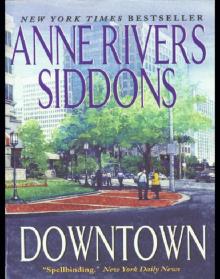 Downtown
Downtown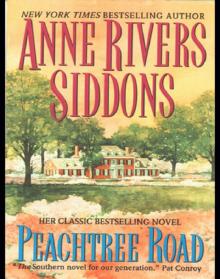 Peachtree Road
Peachtree Road Sweetwater Creek
Sweetwater Creek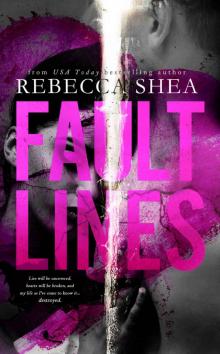 Fault Lines
Fault Lines Low Country
Low Country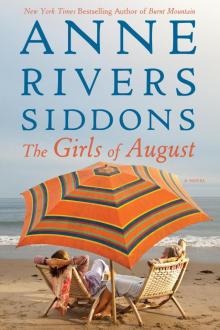 The Girls of August
The Girls of August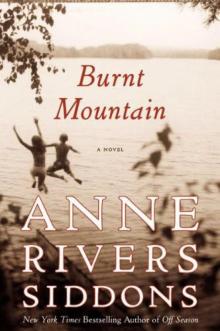 Burnt Mountain
Burnt Mountain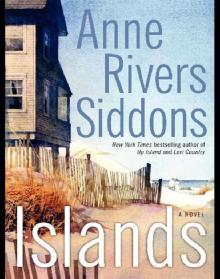 Islands
Islands